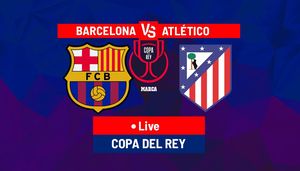The post-show conflict between Yeliz Koc and Maurice Dziwak following their appearances on the reality show Dschungelcamp has taken center stage, with serious allegations of bullying surfacing during the nachspiel. The verbal spat evolved significantly as the contestants addressed grievances from their time on the show, leading to heightened tensions and shocking revelations.
Yeliz Koc, 31, did not hold back during the aftershow, where she accused her former campmate Maurice Dziwak, 26, of persistently calling her "Yeliz Kotz"—a claim she characterized as bullying. During the show, she noted, "Er hat mich gefühlt jeden Tag Yeliz Kotz genannt. Irgendwann habe ich gesagt: Als ob du nicht weißt, wie man es ausspricht?! (Er ist ja auch mit meiner Schwester gut, er weiß, wie man den Namen richtig ausspricht!)" This dramatic portrayal encapsulated her frustrations about what she perceives as targeted mockery.
The confrontation escalated during the live nachspiel, where both Yeliz and Maurice were challenged about their behaviors. Yeliz recounted, "Beim Wiedersehen meinte ich, schwöre auf deinen Sohn, du hast es nicht gesagt? Und er hat eiskalt geschworen. Da habe ich gemerkt, der Typ ist durch im Kopf." These comments showcased the emotional intensity of their exchange as Yeliz emphasized her disbelief over Maurice's continued denials.
Support came from fellow contestant Sam Dylan, who confirmed the conflict's intensity, stating, "Da haben sich die beiden richtig gestritten und Yeliz hat auch immer gesagt, 'du hast meinen Namen so genannt'." This admission highlighted the chaotic atmosphere during the reunion, where their disagreement stirred hyperbole, indulging the audience's curiosity without any resolution.
Despite Yeliz's poignant accusations, Maurice dismissed the bullying claims. He maintained he never intended to belittle her and consistently denied using the derogatory nickname. This strife reveals not only personal grievances but also raises broader questions about the authenticity of narratives constructed within reality television and the perceptions presented to audiences.
Yeliz articulated her belief concerning Maurice's intentions, asserting, "Er wollte mich einfach ständig provozieren, vom ersten Tag an!" This statement suggests she felt targeted throughout their time on the show, seeking to provoke responses for audience engagement. Upon exiting the camp, Yeliz shared insights from conversations with Maurice's mother, who allegedly remarked on Maurice's admiration for her and how he thought her presence would benefit his standing on the show.
Yeliz's portrayal of the events was one of frustration, particularly feeling disheartened by how the network edited significant moments out of the broadcast. She expressed disappointment, remarking, “Das wurde natürlich auch nicht gezeigt!” Her contention lies not only with Maurice's actions but also with the editing decisions made by RTL, which curiously omitted the most provocative exchanges.
The aftershow discussion unveiled layers of complexity masked during the original airings, where viewers perceived alliance or camaraderie between Yeliz and Maurice. Her assertion conveyed mechanisms of manipulation, hinting at strategies intended to twist public perception. Yeliz succinctly underscored this sentiment by referring to Maurice's consistent derision as his calculated technique to influence viewer sympathy.
The significant ramifications of this conflict also extend to the reality TV format itself, with the distinct possibility of audience shift perceptions influenced by selective broadcasting. The unresolved tension resonates with the show's undercurrents, forcing behind-the-scenes politics to vie for viewer attention.
Despite the uproar, the narrative of bullying highlights the broader discourse on societal perceptions of gender, rivalry, and remorse within competitive environments, particularly entertainment forms often critiqued for their ethical ramifications. Even with the spotlight on her claims, Yeliz remains frustrated by the absence of accountability from Maurice, who has yet to apologize publicly.
While the televised aftershow gave audiences only glimpses of the real drama, Yeliz's conviction implies her determination to seek justice; she energetically addresses the mischaracterization she endured. The conflict between Yeliz Koc and Maurice Dziwak could have lasting consequences for their public images and reality TV's portrayal of interpersonal relationships.
Despite the final conclusions seeming elusive, it is clear the story is far from over. Viewers and fans will continue to follow Yeliz and Maurice's developments, as the wounds from the Dschungelcamp experience remain fresh and unresolved.



